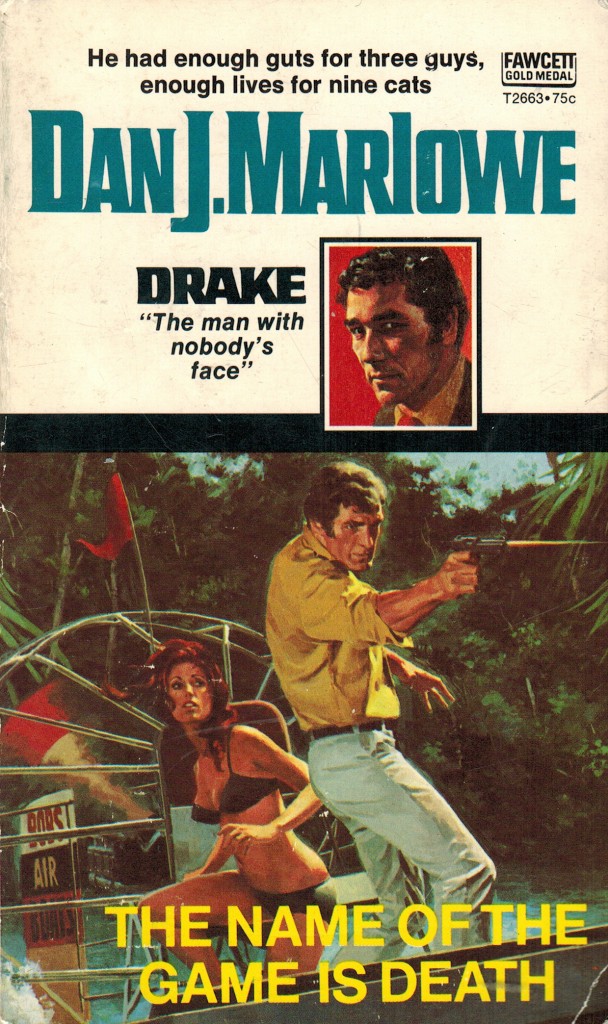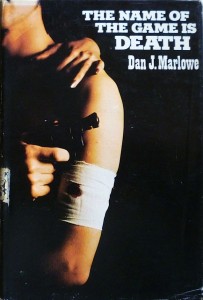Today’s Pulp Friday offering will be familiar to fans of hardboiled crime fiction, the 1972 edition of The Name of the Game Is Death, by Dan J Marlowe, published by Fawcett Gold Medal.
Although Marlowe is not well known today, aficionados acknowledge he had a major impact on the genre. His books are often compared to Jim Thompson and he influenced writers such as Steven King, and no doubt many others.
I first heard of The Name of the Game is Death during an interview I conducted last year with New Jersey-based Wallace Stroby for issue 17 of Crime Factory (that interview is available in full here). I asked Stroby about some of the lesser-known sixties pulp paperback crime writers who had influenced him, and he nominated Marlowe and, in particular, this book.
Originally published in 1962, The Name of the Game Is Death begins with three criminals pulling a bank heist in Phoenix, Arizona. One of the team is killed in the attempted getaway, another flees to Florida with the money, while the third, the narrator, plans to meet up with him later when police attention has died down. When the accomplice breaks contact, the narrator suspects something is up and travels to the small town from which the accomplice last contacted him, to see for himself what has happened.
The book is well written and very, very hard-boiled. The narrator is a cold-blooded sociopath who expresses very little remorse in killing. The story also contains a fair amount of sex, much of it quite kinky, which I have to say was a pleasant surprise as a lot of the white guys writing pulp for Fawcett in the sixties were pretty vanilla.
Unlike The Hunter, the first Parker book written by Donald Westlake under the pen name Richard Stark, it appears Marlowe intended The Name of the Game Is Death to be a series. The main character who is only known by a series of false names in the first book, returned as Earl Drake in One Endless Hour (1962).
Under the influence of Marlowe’s editors, Drake then become an international spy in a series of ‘Operation’ novels (the point at which, according to Stroby, the quality of the books declined markedly), with Drake was billed as ‘The Man With Nobody’s Face’, because his face had been horribly damaged by fire at the end of The Name of the Game Is Death and was reconstructed by plastic surgery in One Endless Hour.
Marlowe himself was an interesting and somewhat mysterious character. He was a Rotarian, gambler, a heavy drinker and, despite not being particularly attractive, a womaniser. He also had a long association with a real life criminal, a bank robber called Al Nussbaum, who Marlowe befriending in prison and who helped the author achieve a certain criminal authenticity in his work.
UK crime publisher Allen Guthrie’s site has a good article on Marlowe. The author of this, Charles Kelly has also written a book on Marlowe’s life, Gunshots in Another Room: The Forgotten Life of Dan G Marlowe, available on line, which is supposed to be very good.






















Yet another author/ book to add to my growing TBR list. Going to check out my stalemate Wallace Stroby’s interview, too.
Mark,
Thanks for stopping by. I think’s more an interesting book rather than a must read. I had a devil of a time getting the book in Australia, but you should be able to source it fairly cheaply and easily in the US.
Cheers,
Andrew
If Dan J. Marlowe had not been a pudgy bookkeeper and small-town Republican councilman, he might be better known today. “The Name of the Game Is Death” is one of the great anti-hero crime novels, and its sequel and a few of Marlowe’s other books are almost as good.
=================================
Detectives Beyond Borders
“Because Murder Is More Fun Away From Home”
http://detectivesbeyondborders.blogspot.com
Andrew, I;d say it’s closer to a must read than it is to an interesting book.
Peter,
As I indicate in the piece, it is obviously an important book in the history of hard boiled crime fiction. It is also better written than a lot of the pulp produced around that time, including by Gold Medal. Certainly, if you are interested in dark, criminal anti-heroes, it is an important books to cover off on. I don’t think it is as good as well written and sophisticated as Westlake’s Parker books, but that could be a matter of individual taste.
Cheers,
Andrew
I invoked Parker in one of my discussions of the book, I think the one to which I posted a link in a comment on your Facebook posts.
You may be right. For one thing, Westlake has to get points for keeping Parker going for so long, and for hitting the heights in an impressive number of the books. I think “The Name of the Game Is Death” may be as good as the best of the Parkers, but Westlake needs to get credit for turning out not just “The Hunter” but also “The Outfit.” “The Score,” “Butcher’s Moon,” and a number of books that are not quite up to that level, but still damn good.
On the other hand, the character who later came to be called Drake is colder and harder than Parker is after the first few books.
Yes, I agree with your point that the character called Drake is colder and harder than Parker, although I don’t think he is nearly as clever.
Though Marlowe probably should have known right away that the bank-robbing protagonist of The Name of the Game is Death would be an excellent series character, he actually meant the book to be a stand-alone. He only wrote the sequel, One Endless Hour, at the urging of his bank robber friend Al Nussbaum. Then the character was picked up and made into a “special agent” type in the “Operation” novels. Nussbaum asserted that he helped a great deal with the plot of One Endless Hour, and later was a suspect in an Illinois bank robbery much like the one carried out in the novel.
Charles,
Thanks for clarifying the point about Marlowe intending The Name of the Game is Death to be a stand alone. I did not say it in the piece but I have your Marlowe bio but have not read it. I must rectify that.
Andrew
Here’s a piece that Wallace Stroby wrote on his site about The Name of the Game is Death.
http://wallacestrobycom.blogspot.com.au/2009/05/black-lizard-lounge-2-name-of-game-is.html
Pingback: Interview: New Jersey crime writer, Wallace Stroby | Pulp Curry